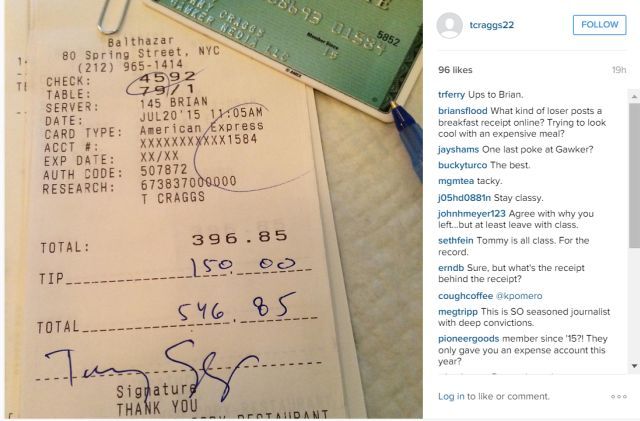Gawker.com, the popular gossip blog, hasn't published an article since midday yesterday — Monday, the 20th of July. This follows the resignation of Tommy Craggs, the executive editor of Gawker's parent company, Gawker Media, and Max Read, the editor-in-chief of Gawker itself, over the removal of an article written by Jordan Sargent last week.
[Editor's Note: Gawker has once again started publishing on Wednesday, July 22nd]
Continuing Web Culture's mission to investigate all the drama that happens online, let's have a look at what is going on.
The Hit Piece
Jordan Sargent, a writer at Gawker not known for his empathy, wrote an article outing the CFO of a major media company as gay. The subject of Sargent's piece, who I refuse to name for moral reasons, allegedly tried to hire an unnamed escort and gay pornstar.
The escort, on finding out who was supposedly seeking his services, allegedly attempted to blackmail the CFO into using his connections to help him with a rent dispute. When the CFO refused to help, the escort approached Gawker, who then published the article, alongside a number of embarrassing images and screenshots, outing the CFO, thus helping the escort carry through on his blackmail threat.
The Criticism
The article itself was a poorly disguised hit piece. Regardless of the truth of the allegations, Gawker's reporting was unnecessary. The CFO had not publicly come out as gay and was married to a woman. Even if he was cheating on his wife, the fact that it was with a man was a minor point, not a salacious fact to be shouted from the rooftops.
Within minutes of the article being published, Gawker was facing an entirely justified flame war. There are more than 2500 comments on the original article, the vast majority of which are critical of the piece.
Writing for Vox, German Lopez identified the major issues with Gawker's piece:
The story had many problems — including the question of whether the subject is prominent enough to be covered at all. But for the LGBTQ community in particular, the story brings back memories of people effectively weaponizing a person's sexual orientation or gender identity for blackmail and other threats.
Twitter also lit up with "Gawker" trending around the world.
Some people even began contacting Gawker's advertisers, encouraging them to stop supporting the site.
The Article Comes Down
In response to the unrelenting criticism, Gawker Media's executive committee, including founder and CEO Nick Denton, met and voted 4–2 to pull the article; Craggs was one of the only dissenting voices. Denton released a statement describing their reasoning.
He wrote:
The story involves extortion, illegality and reckless behaviour, sufficient justification at least in tabloid news terms. The account was true and well-reported. It concerns a senior business executive at one of the most powerful media companies on the planet.
In the early days of the Internet, that would have been enough. 'We put truths on the Internet.' That has been the longstanding position of Gawker journalists, some of the most uncompromising and uncompromised on the Internet. I cannot blame our editors and writers for pursuing that original mission.
But the media environment has changed, our readers have changed, and I have changed. Not only is criticism of yesterday's piece from readers intense, but much of what they've said has resonated. Some of our own writers, proud to work at one of the only independent media companies, are equally appalled.
In place of the original post there is now a disclaimer linking to Denton's statement.
The Staff React
Rather than this be the end of things, Gawker's newly unionized editorial staff took issue with how the post was removed. In a statement on their blog on Friday, they wrote:
Our union drive has expressed at every stage of the process that one of our core goals is to protect the editorial independence of Gawker Media sites from the influence of business-side concerns. Today's unprecedented breach of the firewall, in which business executives deleted an editorial post over the objections of the entire executive editorial staff, demonstrated exactly why we seek greater protection. Our opinions on the post are not unanimous but we are united in objecting to editorial decisions being made by a majority of non-editorial managers. Disagreements about editorial judgment are matters to be resolved by editorial employees. We condemn the take-down in the strongest possible terms.
Over the weekend, the discussion around Gawker's handling of the whole situation continued to trend around the web. Behind the scenes however, something was obviously happening.
Yesterday, Tommy Craggs and Max Read announced their resignations from the company. Both published lengthy statements condemning how the executive committee had pulled the original article. However, neither issued any apology for the contents of it. Craggs' last act appears to have been to expense a costly breakfast to Gawker.
What Now?
Gawker Media is clearly in turmoil. Gawker.com stopped publishing anything from the resignation of Craggs and Read until two days later. The other sites in Gawker's network continued to publish as normal, but there is no telling how the fallout will effect them. A lot will likely depend on who Gawker hires to replace Read and how much editorial independence the other editors-in-chief feel they have.
It is entirely possible, and some people are hoping, that Gawker Media will collapse.
As ever, what do you think of the entire situation? Are you glad that Gawker appears to be collapsing or do you think it will be a loss for the Internet? In the mean time, you may want to check out some alternative websites to get your celebrity news.


